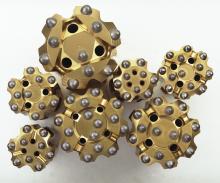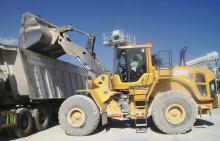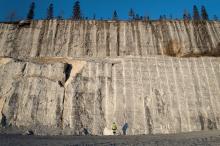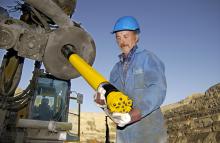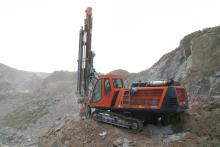
Demand for high quality aggregates in the United Arab Emirates remains strong and one drill and blast contractor is investing to improve productivity
Although construction projects in Dubai and Abu Dhabi demand large volumes of aggregates, many quarries in those regions are being closed by authorities. Much of the demand is being met by quarries in the Emirate of Fujairah which are fast becoming the regions' 'bread basket' for gabbro aggregates.
Meeting this demand is a challenge for these quarries and contract drilling and blasting teams are proving essential, as is investment in productivity-enhancing technology. Fujairah-based Technical Drilling and Blasting Company is one of the contractors gaining from this demand and has just standardised its operations to improve its productivity.
Despite the economic slowdown, the contractor reports that demand for drilling and blasting services remains high and it is one of five organisations operating in Fujairah. The company attributes the demand to the quality of the gabbro in the region with a typical density of 3tonnes per m3 and a 61% silica content. The Technical Drilling and Blasting Company has said that there is currently an almost continuous stream of trucks carrying aggregates travelling over the Hajjar Mountains from Fujairah to other UAE regions.
To help meet this high demand, the company now uses
According to the company's project manager Alok Ojah, the key to much of the contractor's success has been the operational life and productivity of its Sandvik rock tools; all ordered through local distributor Dynatrade.
"Initially we used rock tools from the respective rig manufacturers but trials soon found that the Sandvik rock bits and rods were providing 100% longer operational life," he said. "For example, we were using 60 rods which were continually 'snapping' compared with 30 Sandvik rods in the same conditions. For the drill bits, the life expectancy was even greater, as much as three times with Sandvik Retrac bits." Armstrong added that generally in the hard rock conditions, the company was getting 700-800 drill metres per bit and up to 2000m in softer conditions. Technical Blasting and Drilling carry out on-site regrinding after the first 400m with a second regrind after another 200m.
Technical Blasting and Drilling take on responsibility for the whole blasting process for its quarry operator clients. Each blast site is thoroughly surveyed with extensive details of each drill hole recorded and the actual blasts are planned weeks in advance and the explosives ordered by the contractor.
The operation is strictly controlled with the UAE police and security witnessing all blasting operations and with careful monitoring of the explosives used. However, the growth in demand for aggregates over recent years put extra strain on the police forces resources and Technical Drilling and Blasting has been negotiating with the local authorities for a change in restrictions that would help ease the situation.
According to the company, until recently only two blasts with a maximum of 3tonnes each per day were permitted at each site. Nonetheless, the company has worked with the authorities to demonstrate that a single blast of 10tonnes can be safely carried out and would reduce administrative work for the police.
Armstrong said that he is still actively working to increase the limit to 10tonnes in a bid to streamline process. "We still generally manage to blast 65,000m3 per month but we have capacity for around 80,000m3 per month," he said.

